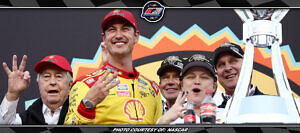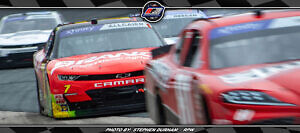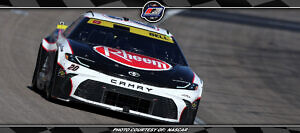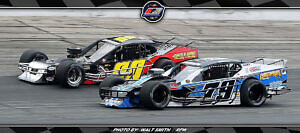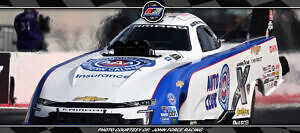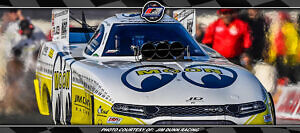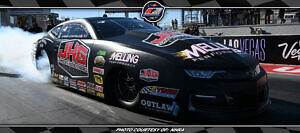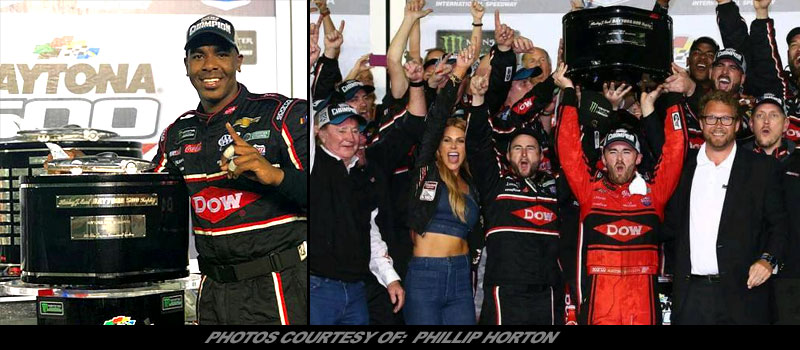
Column By: HOLLY CAIN / NASCAR – DAYTONA BEACH, FL – As a kid growing up in Baltimore or even a college student leading the High Point University (N.C.) basketball team, Derrell Edwards says he would never have predicted that his greatest sporting honor would be celebrating a Daytona 500 triumph in NASCAR racing’s most famous victory lane.
“It’s been surreal for me actually,’’ said Edwards, who is the first member of NASCAR’s Drive for Diversity program to be a part of the winning Daytona 500 pit crew and believed to be the first African-American to win the race as an over-the-wall crew member.
“Without any background of NASCAR it hasn’t sunk in to the point it would if I had been a racer all my life. But as an athlete, I’ve been an athlete all my life so it’s definitely the biggest thing I’ve ever felt.
“I’ve won championships in college and in high school but this is those things on steroids.”
“It’s an exciting feeling and to do it with a special group of guys we have this year, has been just unbelievable, honestly. It still hasn’t sunk in fully yet, it’s been sinking in day by day by day. Actually one of the veteran tire changers told me, ‘Honestly, you won’t really understand what you’ve done for another 20 years.’”
Edwards works as a jackman and tire carrier for Austin Dillon’s iconic No. 3 Chevrolet after joining the Richard Childress Racing team last season when he crewed Paul Menard’s car in the Monster Energy NASCAR Cup Series ranks.
The 26-year old found his way to the sport after a celebrated career leading the High Point University men’s basketball team to a season championship his senior year in school.
A conversation about a pit crew opportunity at NASCAR Hall of Famer Childress’ team that same year piqued Edwards’ interest in the sport, which he concedes he hadn’t really followed before.
He earned an internship with RCR in the spring of his final year of college. And after graduation, Edwards spent a year learning the craft in the ARCA Series then got the opportunity to step up to the Xfinity Series (with RCR’s Brendan Gaughan) and some limited experience at the Monster Energy Series level before getting hired to work fulltime with the Menard car in 2017. Edwards has been actively involved in the Drive for Diversity program for the last two years.
Listening to Edwards speak about his time in NASCAR, it’s obvious that his rise in the sport is more than a selfish pursuit. He is genuinely excited about what his accomplishment may inspire in others, as what it validates in himself.
“I wouldn’t have dreamed this or written this down in a million years that I’d be in NASCAR,’’ Edwards said. “But opportunity presented itself.
“I never really regret too many decisions I make. This is definitely one of the best I’ve ever made in my life. I believe it’s happening for a reason and I’m getting this platform for a reason and it’s probably a story that needs to be shared and told to kids that are back in places like Baltimore where I’m from, that think there isn’t any hope.
“I really want to pride myself in getting this story out there and being able to share it with some kids back home and all over the U.S. – that if I can, they can.”
Edwards’ enthusiasm is sincere and inspiring. He isn’t just someone who wants to make a difference. He is making a difference.
This year’s Daytona 500 was a significant turning point for the sport in some ways. Not only did Edwards make history with his work on the winning team. The race’s runner-up finisher, Darrell Wallace Jr. became the highest finishing African-American driver ever in the 500.
“I feel like it’s happening,’’ Wallace said excitedly. “Timing is everything and this is perfect timing.’’
“Some people just feel like they may not have a chance to even be a part of NASCAR but I’m living proof that from my culture as a minority you can get into it and be successful as well,’’ Edwards continued. “It’s showing that NASCAR has no problem with it. And that’s what I love. It’ll be great for NASCAR to get these different viewers in, more people interested and getting into the sport itself.”
And Edwards, points out, even the “lucky penny” that his driver Dillon was given the week before the race – and carried in his car during Sunday’s 500 – was given to him by an 11-year old African-American fan Jordan Wade, from Bradenton, Fla.
Afterward, Dillon wrote a letter to Wade’s elementary school teacher to ask for an excused absence for the youngster.
“Please allow Jordan to be excused from the last two days. He was crucial in our Daytona 500 victory.”
It all just seemed to connect for Edwards.
“Even Jordan, who handed Austin that penny before the race, it’s awesome to see him all over TV as well,’’ Edwards said. “He’s definitely going to have some kids think they can get into NASCAR and have a chance as well. I thought that story was awesome.’’
And the larger story here – important, historic milestones in the sport – will be celebrated for decades thanks to Edwards, and all those who he hopes to inspire.
“Not just me, but anybody to win the first of anything or to be the first at anything is a cool deal,’’ Edwards said. “I think it is a pretty big deal.”
“I’ve actually been getting tons of calls from friends and even media back home. My friends and everyone there, they know I’m in NASCAR and on a pit crew, but now that they see I’ve won the Daytona 500.
“I feel special to be able to do that for the sport. That’s always a goal of mine. I love what [pit crew coach] Phil Horton has done with Drive for Diversity.
“And I can say there will definitely be some different viewers watching NASCAR on Sundays, for sure.”

